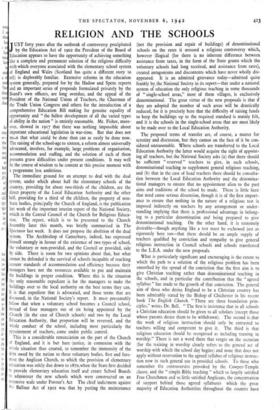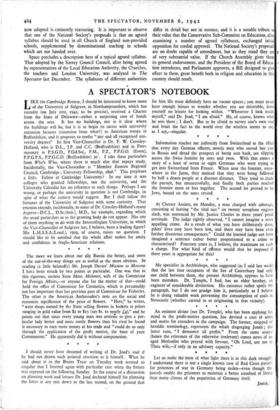RELIGION AND THE SCHOOLS UST forty years after the outbreak
of controversy precipitated 11 by the Education Act of 1902 the President of the Board of Education appears to have the opportunity of achieving something like a complete and permanent solution of the religious difficulty with which everyone associated with the elementary school system of England and Wales (Scotland has quite a different story to tell) is deplorably familiar. Extensive reforms in the education system generally, prepared for by the Hadow and Spens reports and an important series of proposals formulated privately by the Board's own officers, are long overdue, and the appeal of the President of the National Union of Teachers, the Chairman of the Trade Union Congress and others for the introduction of a comprehensive Education Bill making for genuine equality of opportunity and "the fullest development of all the varied types of ability in the nation" is entirely reasonable. Mr. Fisher, more- over, showed in 1917 that there was nothing impossible about important educational legislation in war-time. But that does not medn that what could be done then can as easily be done now. The raising of the school-age to sixteen, a reform almost universally advocated, involves, for example, large, problems of organisation, accommodation and staffing, and the solution of each of them presents grave difficulties under present conditions. It may well be the course of wisdom to be content at this precise moment with a programme less ambitious.
The immediate ground for an attempt to deal with the dual system, under which about half the elementary schools of the country, providing for about two-thirds of the children, are the direct property of the Local Education Authority and the other half, providing for a third of the children, the property of non- State bodies, principally the Church of England, is the publication last week of the important interim report of the National Society, which is the Central Council of the Church for Religious Educa- tion. The report, which is to be presented to the Church Assembly later this month, was briefly summarised in The Spectator last week. It does not propose the abolition of the dual system. The Archbishop of Canterbury, indeed, has expressed himself strongly in favour of the existence of two types of school, the voluntary or non-provided, and the Council or provided, side by side. There is room for two opinions about that, but what cannot be defended is the survival of schools incapable of reaching current standards of accommodation and efficiency because their managers have not the resources available to put and maintain the buildings in proper condition. Where this is the situation the only reasonable expedient is for the managers to make the buildings over to the local authority on the best terms they can. It is that expedient that is advocated, and those terms that are discussed, in the National Society's report. It must presumably follow that when a voluntary school becomes a Council school, instead of four managers out of six being appointed by the Church (in the case of Church schools) and two by the Local Education Authority, that proportion will be reversed, and the whole conduct of the school, including most particularly the appointment of teachers, come under public control.
This is a considerable renunciation on the part of the Church of England, and it is but bare -justice, in connexion with the whole situation thus created, to remember the immensity of the debt owed by the nation to those voluntary bodies, first and fore- most the Anglican Church, to which the provision of elementary education was solely due down to 187o,when the State first decided to provide elementary education itself and create School Boards to administer the new schools which were constructed on an extensive scale under Forster's Act The chief indictment against the Balfour Act of 1902 was that by putting the maintenance (not the provision and repair of buildings) of denominational schools on the rates it aroused a religious controversy which, however illogical (for there is no inherent difference between assistance from taxes, in the form of the State grants which the voluntary schools had long received, and assistance from rates), created antagonisms and discontents which have never wholly dis- appeared. It is an admitted grievance today—admitted quite frankly by the National Society in its report—that under a national system of education the only religious teaching in some thousands of "single-school areas," most of them villages, is exclusively denominational. The great virtue of the new proposals is that if they are adopted the number of such areas will be drastically reduced, for it is precisely here that the difficulty of raising funds to keep the buildings up to the required standard is mainly felt, and it is the schools in the single-school areas that are most likely to be made over to the Local Education Authority.
The proposed terms of transfer are, of course, a matter for scrutiny and discussion, but they cannot on the face of it be con- sidered unreasonable. Where schools are transferred to the Local Education Authority the latter would acquire the right of appoint- ing all teachers, but the National Society asks (a) that there should be sufficient " reserved " teachers to give, in such schools, denominational teaching to supplement general religious teaching, and (b) that in the case of head teachers there should be consulta- tion between the Local Education Authority and the denomina- tional managers to ensure that no appointment alien to the past aims and traditions of the school be made. There is little here that need cause serious dissension, though it is of the first import- ance to ensure that nothing in the nature of a religious test is imposed indirectly on teachers by any arrangement or under- standing implying that there is professional advantage in belong- ing to a particular denomination and being prepared to give denominational teaching. On the other hand, it is extremely desirable—though anything like a test must be eschewed just as rigorously here too—that there should be an ample supply of teachers qualified by conviction and sympathy to give general religious instruction in Council schools and schools transferred to the L.E.A. under the new proposals.
What is particularly significant and encouraging is the extent to which the path to a solution of the religious problem has been smoothed by the spread of the conviction that the first aim is to give Christian teaching rather than denominational teaching in the schools, and in particular the contribution that the "agreed syllabus" has made to the growth of that conviction. The general aim of those who desire England to be a Christian country has been admirably stated by the Bishop of Chichester in his recent book The English Church. "There are three foundation prin- ciples," writes Dr. Bell. "The first is insistence that in all schools a Christian education should be given to all scholars (except those whose parents desire them to be withdrawn). The second is .that the work of religious instruction should only be entrusted to teachers willing and competent to give it. The third is that religious education should be recognised as including training in worship." There is not a word there that verges on the sectarian (for the training in worship clearly refers to the general act of worship with which the school day begins) and none that does not apply without reservation to the agreed syllabus of religious instruc- tion now in such general use in provided schools. To those who remember the controversies provoked by the Cowper-Temple clause, and the "simple Bible teaching" which so largely satisfied Free Churchmen and so little satisfied Anglicans, the concentration of support behind those agreed syllabuses which the great majority of Education Authorities throughout the country have now adopted is eminently reassuring. It is important to observe that one of the National Society's proposals is that an agreed syllabus should be used in all Church of England non-provided schools, supplemented by denominational teaching in schools which are not handed over.
Space precludes a description here of a typical agreed syllabus. That adopted by the Surrey Council Council, after being agreed by representatives of the Local Education Authority, the Churches, the teachers and London University, was analysed in The Spectator last December. The syllabuses of different authorities differ in detail but not in essence, and it is a notable tribute t their value that the Conservative Sub-Commitee on Education, after examining a number of agreed syllabuses, exchanged initial opposition for cordial approval. The National Society's proposals are no doubt capable of amendment, but as they stand they are of very substantial value. If the Church Assembly gives then its general endorsement, and the President of the Board of Educa- tion introduces, and Parliament approves, a Bill designed to give effect to them, great benefit both to religion and education in th;s country should result.



























 Previous page
Previous page